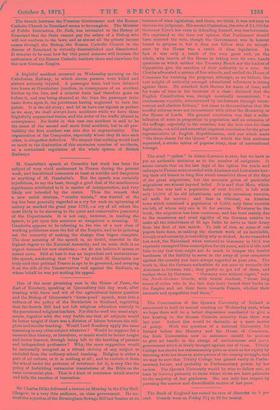Sir Charles Dilke delivered a lecture on Monday in the
City Hall, Glasgow, to a very thin audience, on class government. He no- ticed the rejection of the Birmingham Sewage Bill last Session as an instance of class legislation, and there, we think, it was not easy to traverse his judgment. His second illustration,the vote of 14,000 for Governor Eyre's law costa in defending himself, was less fortunate. We expressed at the time our opinion that Parliament should have rejected the vote, though the Government was in honour bound to propose it, but it does not follow that its accept- ance by the House was a result of class legislation. In fact it was only a result of the very great and, on the whole, wise inertia of the House in taking into its own hands questions on which neither the Treasury Bench nor the leaders of Opposition give the sanction of their authority to a veto. Sir Charles advocated a system of free schools, and reviled the House of Commons for resisting the proposal, although, as we believe, the vast weight of authority amongst educational reformers is strong against them. He attacked both Houses for waste of time, and for waste of time in the interests of a class ; declared that the English Constitution was, though nominally monarchical, "a cumbersome republic, administered by landowners through incon- venient and obsolete fictions," but came to the conclusion that the needful reforms were not inconsistent with either the Monarchy or the House of Lords. His general conclusion was that a redis- tribution of seats in proportion to population and an extension of the suffrage, especially in the counties, was the true cure for class legislation, —a mild and somewhat impotent conclusion for the great representative of English Republicanism, and one which made "the three cheers for the Queen" with which the thin audience separated, a stroke rather of popular irony, than of conventional homage.


































 Previous page
Previous page